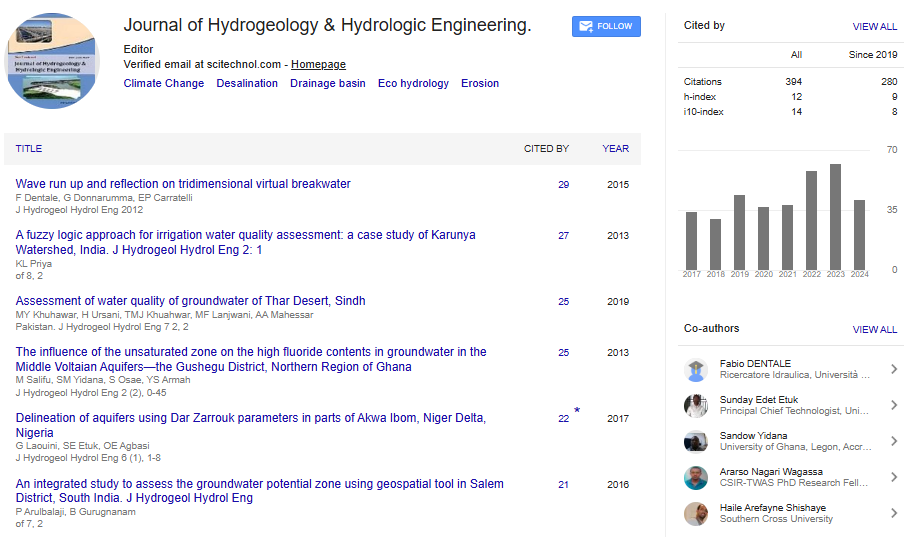Perspective, J Hydrogeol Hydrol Eng Vol: 13 Issue: 3
The Function of Hydrology in Ecological Water Resource Management
Subodh Pal*
1Department of Hydrology, Ludong University, Yantai, China
*Corresponding Author: Subodh Pal,
Department of Hydrology, Ludong
University, Yantai, China
E-mail: palsubodh3@gmail.com
Received date: 27 May, 2024, Manuscript No. JHHE-24-144602;
Editor assigned date: 30 May, 2024, PreQC No. JHHE-24-144602 (PQ);
Reviewed date: 13 June, 2024, QC No. JHHE-24-144602;
Revised date: 21 June, 2024, Manuscript No. JHHE-24-144602 (R);
Published date: 28 June, 2024, DOI: 10.4172/2325-9647.1000323
Citation: Pal S (2024) The Function of Hydrology in Ecological Water Resource Management. J Hydrogeol Hydrol Eng 13:3.
Description
Hydrology, the scientific study of water in the Earth's system, plays a precarious role in understanding and managing water resources. As global demand for water increases and climate change alters precipitation patterns, the need for sustainable water management becomes ever more pressing. This article delves into the significance of hydrology in sustainable water management, exploring its key principles, methods, and applications. Hydrology encompasses the distribution, movement, and properties of water in the environment, including its interactions with the atmosphere, land, and ecosystems. It covers various aspects such as precipitation, evaporation, transpiration, infiltration, and runoff. By analyzing these processes, hydrologists can predict water availability, assess flood risks, and develop strategies for water conservation.
Flooding is a significant natural hazard that can cause extensive damage to infrastructure and ecosystems. Hydrologists play an essential role in assessing flood risks by analyzing historical data, precipitation patterns, and topography. They develop flood models to predict the extent and impact of floods, which inform the design of flood defenses and early warning systems. Sustainable flood management strategies also include preserving natural floodplains and wetlands, which can absorb excess water and reduce flood risks. As populations grow and urbanize, ensuring a reliable water supply becomes increasingly challenging. Hydrologists assess water availability by monitoring river flows, groundwater levels, and reservoir storage. They develop models to predict future water demand and supply, considering factors such as population growth, climate change, and land use changes. Sustainable water supply planning involves optimizing the use of existing resources, promoting water conservation, and developing alternative sources such as desalination and water reuse.
Groundwater is a vital source of water for agriculture, industry, and drinking. Over extraction of groundwater can lead to depletion, land subsidence, and reduced water quality. Hydrologists study groundwater recharge rates, aquifer characteristics, and water quality to develop sustainable extraction plans. They also promote practices such as artificial recharge, where excess surface water is directed to recharge aquifers, and the protection of recharge areas from contamination. Healthy ecosystems depend on adequate and clean water supplies. Hydrologists assess the water needs of ecosystems, including rivers, wetlands, and lakes. They develop strategies to balance human water use with ecological requirements, ensuring that ecosystems receive enough water to support biodiversity and maintain their functions. Sustainable water management practices include restoring natural flow regimes, reducing pollution, and protecting precarious habitats.
Conclusion
Hydrology is fundamental to sustainable water management, providing the knowledge and tools needed to understand and manage water resources effectively. By integrating hydrological principles into planning and decision-making, we can ensure a reliable and sustainable water supply for current and future generations. As climate change and population growth continue to challenge water resources, the role of hydrology will become even more precarious in achieving sustainable water management. Climate change is altering precipitation patterns, increasing the frequency and intensity of extreme weather events, and affecting water availability. Hydrologists study the impacts of climate change on water resources and develop adaptation strategies. These include enhancing water storage capacity, improving water use efficiency, and developing drought-resistant crops. Integrating climate change projections into water management plans helps ensure the resilience of water systems in the face of changing conditions.
 Spanish
Spanish  Chinese
Chinese  Russian
Russian  German
German  French
French  Japanese
Japanese  Portuguese
Portuguese  Hindi
Hindi 
